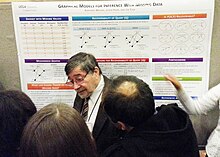
Back جوديا بيارل Arabic جوديا بيارل ARZ Cuda Perl Azerbaijani یودیا پرل AZB জুডেয়া পার্ল Bengali/Bangla Judea Pearl Catalan Judea Pearl Czech Judea Pearl German Judea Pearl Esperanto Judea Pearl Spanish
Judea Pearl | |
|---|---|
 Judea Pearl at NIPS 2013 | |
| Born | September 4, 1936 |
| Nationality | Israeli American |
| Alma mater | Technion – Israel Institute of Technology New Jersey Institute of Technology Rutgers University New York University Tandon School of Engineering |
| Known for | Artificial Intelligence Causality Bayesian Networks Structural Equation Modeling |
| Spouse | |
| Children | 3, including Daniel |
| Awards | IJCAI Award for Research Excellence (1999) Turing Award (2011)[1] Rumelhart Prize (2011) Harvey Prize (2011) BBVA Foundation Frontiers of Knowledge Award (2021)[2] |
| Scientific career | |
| Fields | Computer science, statistics |
| Thesis | Vortex Theory of Superconductive Memories (1965) |
| Doctoral advisor | Leonard Strauss Leonard Bergstein |
| Doctoral students | Rina Dechter, Hector Geffner, Elias Bareinboim |
| Website | http://bayes.cs.ucla.edu/jp_home.html |
Judea Pearl (born September 4, 1936) is an Israeli-American computer scientist and philosopher, best known for championing the probabilistic approach to artificial intelligence and the development of Bayesian networks (see the article on belief propagation). He is also credited for developing a theory of causal and counterfactual inference based on structural models (see article on causality). In 2011, the Association for Computing Machinery (ACM) awarded Pearl with the Turing Award, the highest distinction in computer science, "for fundamental contributions to artificial intelligence through the development of a calculus for probabilistic and causal reasoning".[1][3][4][5] He is the author of several books, including the technical Causality: Models, Reasoning and Inference, and The Book of Why, a book on causality aimed at the general public.
Judea Pearl is the father of journalist Daniel Pearl, who was kidnapped and murdered by terrorists in Pakistan connected with Al-Qaeda and the International Islamic Front in 2002 for his American and Jewish heritage.[6][7]
- ^ a b Judea Pearl – A. M. Turing Award winner, ACM, retrieved March 14, 2012.
- ^ BBVA Foundation Frontiers of Knowledge Award (2021). Judea Pearl - Announcement Speech, June 2022.
- ^ Gold, Virginia (March 15, 2012). "Judea Pearl Wins ACM A.M. Turing Award for Contributions that Transformed Artificial Intelligence". The Association for Computing Machinery. Archived from the original on March 17, 2012. Retrieved March 15, 2012.
ACM, the Association for Computing Machinery today named Judea Pearl of the University of California, Los Angeles the winner of the 2011 ACM A.M. Turing Award for innovations that enabled remarkable advances in the partnership between humans and machines that is the foundation of Artificial Intelligence (AI).
- ^ Judea Pearl author profile page at the ACM Digital Library
- ^ Goth, G. (2006). "Judea Pearl Interview: A Giant of Artificial Intelligence Takes on All-Too-Real Hatred". IEEE Internet Computing. 10 (5): 6–8. doi:10.1109/MIC.2006.107. S2CID 9932352.
- ^ Fonda, Daren (September 27, 2003). "On the Trail of Daniel Pearl". TIME. Archived from the original on October 1, 2003. Retrieved July 20, 2011.
- ^ Escobar, Pepe (June 28, 2003). "Who killed Daniel Pearl?". Book Review. Asia Times Online. Archived from the original on June 29, 2003. Retrieved July 20, 2011.